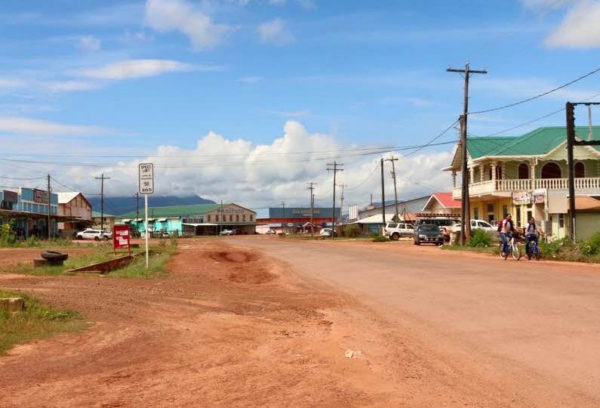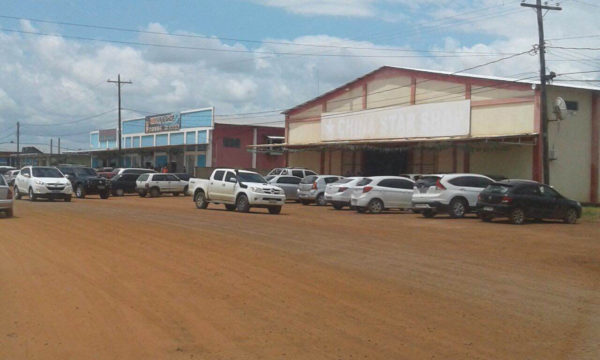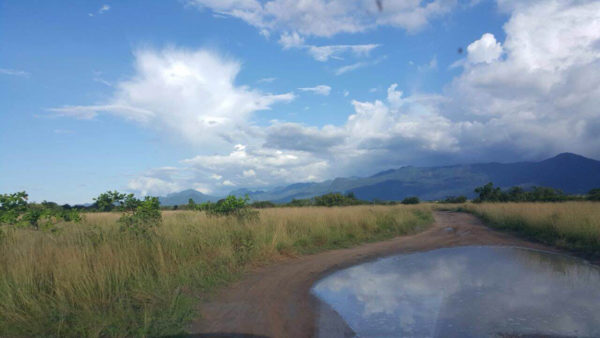With Lethem having been declared a town close to a year now, the Rupununi Chamber of Commerce and Industry (RCCI) is calling on the government to improve its infrastructure so that Brazilians can continue to give the local economy a boost.
Daniel Gajie, immediate past president and Director of Local Government of the RCCI, told Stabroek News last week that there has been no huge government intervention in Lethem which saw historic municipal elections in March.

He said Brazilians coming over to the Upper Takutu/Upper Essequibo border town to support businesses and purchase items that have been brought in from Georgetown, have contributed significantly to the growth and survival of the economy. He noted that this has been happening since 2008 and that the economy “would not be where it is without the Brazilians.”
Gajie was proud that on Brazil’s Independence anniversary on September 7, lots of cars came across the border for the Brazilians to shop and support the local restaurants and even to visit the waterfalls, which have been developed into tourist attractions.
He lamented that in order to encourage the support from Brazilians, the roads, which are in deplorable condition must be rehabilitated and proper lights and security put in place.
He was confident that the amount of Brazilians that come to Lethem every year, is more than the number that passes through Timehri.
“If you have 200,000 plus Brazilians coming to Lethem annually, you have to pay attention to the people’s comfort. We cannot have these types of roads we’re having right now. We cannot have a road without proper lights in the nights or no proper security,” he pointed out.
“We cannot have a road that is not supported by the Local Authority and the Government of Guyana. And the infrastructure must not be ad hoc; it has to be properly planned.”
He recognizes that the businesses here cannot match the modern malls as well as modern bulk shopping stores that Brazil’s Boa Vista has been establishing over the last two years, but said “there should be improvement in the business sector. We have a commercial sector, which could be better.”
According to him, “The infrastructure in Brazil is phenomenal right now, compared to Georgetown, [so] the Brazilians” can stay within their country.
He asked: “Why would they want to come to Lethem and sit in a mosquito-infested restaurant with no proper washroom, to have a meal?”
On that note, he said the businesses “have to modernize. Guyana on the whole has a culture of developing businesses with minimum architectural designs and investment in modern technology.”
He added: “We figure that we just put up four walls and a roof and build some good shelves and have our floors painted… and that is business. That used to be business. In today’s day and age, you have to come with some amount of beauty in your designs and you have to plan.”
He has also observed that everything that is in the stores in Lethem is imported and questioned: “What the Minister of Agriculture, Noel Holder doing? Where is the extension services?”
Private sector
He pointed out that over the last 10 years the private sector has invested in excess of $5B and said “there is no government agency matching that with any form of development, whether it be infrastructure in Lethem, the electricity, telecommunication or the road to Lethem.”
He said the private sector has been playing its part in a very big way and that “we don’t need to be coerced, we don’t need to be begged, we don’t need to be pushed to make the invest You walk around Lethem in any one of those stores, it is comparable to any large investment in Georgetown or even bigger.”
The private sector in Lethem and the Rupununi “is way ahead of the government in terms of investment and we want to move the investment and realize the potential of the economy.”
Gajie, who is the owner of the modern Rupununi Eco Hotel Inc. told this newspaper that the private sector in Lethem employs in excess of 300 to 400 people.
He noted that it was “more than that but because of the political and economic situation in Brazil, over 200 young people had to be laid off.”
The economic situation in Brazil would not improve in a hurry, he said, even though its currency has strengthened.
“The social economy of Brazil has never dropped because that is a country that takes care of its people. If you go to Boa Vista or Manaus… you would wonder if there was any problem. There are thousands of people on the road… in the shopping malls and the restaurants are filled…”
Tourism sector
Gajie told this newspaper that “there are very few sectors that are actually generating some sort of income for the people of the region. In fact, there is only one substantial sector and that is tourism.”
He said there is nothing “of substance happening in the Rupununi, Region 9 that we can safely say that is bringing in an income for the entire region.”
The businessman mentioned that tourism in the North Rupununi has now brought together some eight eco resorts that are working with joint packages and are creating employment for hundreds of young people.
In addition, it is also allowing them to develop themselves and develop a career in these institutions.
He said residents have been struggling with the agriculture sector in the region for decades. Since the fall of the cattle industry in the 60s and 70s, neither government nor the private sector has done anything substantial, except for the recent establishment of the Santa Fe Farm.
This venture, a pilot project located in the North Rupununi, represents a major investment by prominent Barbadian investor, Sir Kyffin Simpson, in Guyana’s agriculture sector.
Rice grown at Santa Fe is exported, while ground provision and other cash crops are sold in Lethem. The rice lands are supplied with water directly from the Ireng River through a gravity irrigation system.
But Gajie said that the farm cannot create hundreds of jobs and have a huge economic spinoff immediately for the region.
As such, all of the resorts in this southern Guyana town have been encouraged and have been implementing small agricultural projects, like shade house gardens, which are supplementing the diet of the visitors.
He mentioned specifically that Rock View Lodge, owned by Colin Edwards, who is the Director of Tourism for the RCCI and a Director of the Tourism and Hospitality Association of Guyana (THAG), has established a kitchen garden and a fish farm.
Challenge
Gajie told this newspaper that there is also a challenge in the Rupununi with obtaining food.
“The long and winding road from Georgetown has a lot of challenges and we cannot depend on anything other than what we can produce solely in the region,” he said.
According to him, “Ninety-five percent of the supply of chicken comes from Brazil and there is nothing they can do to stop the importation. In essence, if we stop it we’re going to starve the region.”
While the region currently has the largest poultry rearing establishment in the Surama Village, 140 km away from Lethem, the cost for production due to the price for feed, is high.
“A pound of good local chicken is over $400. The road transportation is expensive… And by the time it arrives [in Lethem], it might end up at $500 per pound. The residents of Central Rupununi have to look at an alternative.”
Referring to a SN article of February 23, 2015, in which he mentioned that ‘Lethem needs a serious developmental plan,’ he said that goes for the entire Rupununi and called on the authorities to “stop wasting time.”
He noted that the private sector does not waste time “because we invest our money and we have to make money. We have loans to pay, we have staff to pay [and] we have training to do. We can’t waste time; we can’t procrastinate and play games.”
He said if residents are to bring out produce from Parabara, which has the best agricultural produce and is located about 200 km from Lethem, it would take about six hours because the road is “atrocious.”
According to him, “The residents reap one cassava that weighs up to 20 pounds. We need to build on what these villages are doing. They should not be the ones to bring their produce out to Lethem to sell.”
Gajie emphasized that systems should be implemented where the Guyana Marketing Corporation can establish a large market and go to the village and purchase the produce, which can be packaged and exported.
Another challenge facing the private sector is the availability of skilled personnel to work. Speaking about his hotel in particular, he said, “I cannot employ people in a big way because I have to train them from scratch. Nobody knows how to use a spreadsheet or database or do some form of accounting or an invoice.”
He added: “No young person in Lethem is coming to train for free. We have to pay them to train them.”
Gajie would be offering a free five-day training at his hotel from October 19 to the 23 for young people mainly from Lethem between the ages of 18 and 22.
The idea, he said, is that “when the training is completed I can pluck three people out of 20 to employ” while the others would have opportunities with the remaining industry.
He hopes that other agencies; governmental or non-governmental would see the benefits and conduct similar training programmes on a continuous basis in the region.
This should be done until the agencies can construct a facility for school leavers that focuses on hospitality, agriculture and technical skills.
He noted that nursery, primary and secondary education should not be the end and that knowledge gained between the ages of 16 and 25, is what prepares the youths for life.
If there is nothing to occupy their time, he said, then social issues such as teenage pregnancy and starting families at a young age, substance abuse and burglary would continue to plague the society.
Gajie made reference to four young men of a popular football team in the region who recently broke into a business place. “Their school friends were shocked… But I wouldn’t call it a crime… It is a desire to catch up.”
Awareness programmes
He said there has been some welcoming visits by the Guyana Revenue Authority (GRA), which has met with the RCCI and business owners and conducted sensitization and awareness programmes.
He congratulated the new Commissioner General of the GRA and the entire team for the initiative and for helping them to “understand first-hand what is happening.”
He called on the Labour Ministry and other government agencies; the Guyana National Bureau of Standards and the Food and Health Department to do the same.
“It cost one person a minimum of $100,000 just to come out [of Lethem] to obtain a business registration or a passport. How can the ordinary person do that? It means when you travel to Brazil, you have to do so illegally,” Gajie pointed out.
“We are now going to take the bull by the horn and advise the government in cases where they need assistance on policy changes and new legislation and they can move forward with the economy of Lethem and the region much faster.”
To make it happen, he said, the RCCI and the town council need to partner and listen to each other.
The RCCI was established in 2000 and because of its advocacy, it has even been “branded a parallel RDC body. We fight for the interest of everybody; from north, south, east, west [and] we’re getting people involved.”
Gajie lamented that unless the RDC and the Mayor and Town Council “sit down with other stakeholders and say well this is the 10-year development plan for Region 9, then we’re going to be developing in pockets. The economy of North Rupununi is better than any other districts in the region because of tourism and agriculture.”







